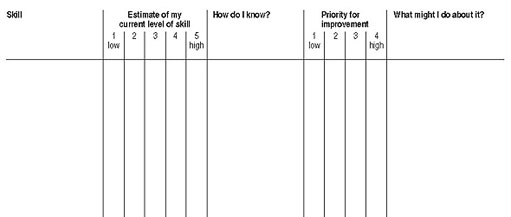5.2 Studying the materials
This is the period when you will be working on your course materials in preparation for the assignment. This may include working through written or electronic texts, any other associated reading or media components, possibly attending a tutorial, accessing any other information that you need and making notes or records of it. Some courses give you a lot of direct guidance on how to work through the course materials; others present you with a range of options and routes. Some courses, particularly those at higher levels, leave you to make the decisions about how to tackle your study. Take advantage of any advice offered but as you become more aware of how best you learn, you will be able to take increasing responsibility for your own learning.
As you study and prepare for the assignment, you may need to use skills or techniques in which you are less confident, possibly those identified during the preparing phase. If so, try to consciously work on the skills that need developing rather than struggling through course material, ignoring areas or activities you find difficult.
This is a good time to complete a skills audit.
Activity 7
Take a break from your work and have a look at the instructions for your next assignment. Make sure you read any student notes very thoroughly and take note of any advice your tutor provides. Really analyse the task(s) involved and identify the skills you will need to complete the assignment successfully. Then draw up and complete a form like the one shown in Figure 3 or, if you prefer, devise one that suits you and the task.
Discussion
Here is Tim's skills audit for the assignment he was planning. As you can see, he has identified a number of skills that the assignment requires and in most of these he feels fairly confident. But there is some material in this part of the course that is new to him and he knows he has problems with it. He decides to really work on the relevant skills because they are important for the assignment.
| Skill | Estimate of my current level of skill | How do I know? | Priority for improvement | What might I do about it? | |||||||
| 1 low | 2 | 3 | 4 | 5 high | 1 low | 2 | 3 | 4 high | |||
| Reading | X | Coping OK but still find that part difficult in terms of maintaining concentration. | X | Look in the Arts Good Study Guide. Ask people on the FirstClass Conference what they do. | |||||||
| Note-taking | X | I can understand them when I start to plan my assignment. | X | I'll just keep practising pattern notes. | |||||||
| Gathering information for assignments | X | It takes ages - I end up going over all my notes plus the whole block again. | X | Bob has same problem. Look in Arts Good Study Guide again. Ask tutor - she said we shouldn't hesitate to phone if we have problems. | |||||||
| Assignment plan | X | Also takes ages - sifting through all that info. | X | As above - I must speed up a bit. | |||||||
| First draft | X | Once I've got the plan I seem to be reasonably OK. It doesn't take that long and I get positive comments from my tutor on my structure. | X | If l can speed up the above then I expect this will take less time. | |||||||
| Being analytical | X | Tutor says on PT3 my marks will improve dramatically once I get away from so much description. | X | Compare my last essay with Bob's. Ask self-help group if anyone's willing to let me look at their assignment when it's been marked. | |||||||
| Look in Arts Good Study Guide. Edit draft carefully. | |||||||||||
| Answering the question | X | Tutor wrote on PT3 that lack of analysis means that I don't fully answer the question. | X | Doing above should help with this. | |||||||
| Organising my time | X | Fit study in OK but underestimate time things take. | X | Hope above will help sort this problem. It all seems to be linked. | |||||||
Sue has a very clear idea of where she needs to develop her skills and makes this a priority for her next assignment. Here is her skills audit.
| Skill | Estimate of my current level of skill | How do 1 know? | Priority for improvement | What might I do about it? | |||||||
| 1 low | 2 | 3 | 4 | 5 high | 1 low | 2 | 3 | 4 high | |||
| understanding key facts and concepts | * | it often takes me a long time and I sometimes miss key points that are crucial | * | try other ways of going through the material; perhaps go to a learning skills workshop | |||||||
| clear writing | * | tutor tells me on assignments | * | keep at it | |||||||
| concise writing | * | tutor tells me on assignments | * | keep at it | |||||||
| coherent writing | * | tutor tells me on assignments | * | keep at it | |||||||
| interpreting data from tables | * | get put off if there are lots of numbers | * | practice, perhaps ask for session in tutorials | |||||||
| interpreting data from charts | * | I sometimes need to draw in lines to help me interpret histograms and bar charts | * | practice, perhaps ask for session in tutorials | |||||||
| interpreting data from graphs | * | if there are several lines on one graph I sometimes take ages to interpret them | * | practice, perhaps ask for session in tutorials | |||||||
| integration of material from different parts of the course | * | there's so much in the course it takes ages to go through it all in case I've missed something relevant | * | discuss with other students over phone or at tutorials | |||||||
| interpretation of new data in relation to material in the course | * | final part of tiered questions seems to test this and I find them the most difficult parts of assignments | * | ask tutor for help if stuck in understanding; ask for practice at tutorials; ask tutor for extra feedback on assignments | |||||||

